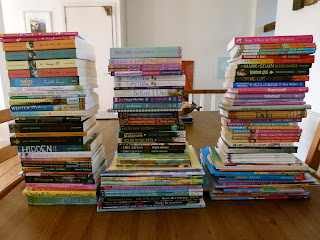It listed the following staggering statistics:
- one in four children is unable to read or write properly when they leave London's primary schools
- three in ten live in households that do not contain a single book
- one in six people in the UK have the literacy level expected of an eleven year old
- in 2005, 1 in 10 of the children and young people surveyed said they did not have a book of their own at home; but by 2011 this figure had increased to an incredible 1 child in 3.
I believe it's because we have two cultures in this country. Those of us who are educated and read all know other people like ourselves who encourage their own children to read.
For these statistics to be true, we must be outnumbered by those for whom reading books is virtually an unknown pasttime.
All my life, newspapers have been wringing their hands about the levels of childhood and adult literacy.
Successive education ministers of every political hue have experimented with different teaching methods.
And all this time the problem has been getting worse and worse.
I believe that it's a root problem of our British culture; a culture that is leading to the closing of so many libraries.
Library closures
I learned my love of books from my local library.But the latest figures on closures are that 415 libraries (323 buildings and 92 mobiles) are currently under threat or closed/have left council control since the beginning of this financial year out of around 4612 in the whole country.
Librarian professional body CILIP forecasts are even worse: it says that 600 libraries are under threat (inc. 20% of English libraries).
This does not include school libraries. Here, as this article from the Guardian reveals:
- school libraries are facing drastic funding reductions
- many school librarians are being downgraded or even made redundant
- School Library Services are closing
- some children’s book awards have folded
- book gifting schemes have had their funding reduced
- some schools have postponed author visits.
The latest library visitor figures, covering the year to March 2011, showed overall library visitor numbers down 2.3% to 314.5 million and book issues down 2.9% to 300.2 million.
Although this is a reduction, it is less than what you might expect given these closures.
In November, Alan Gibbons called for a moratorium on the closure of libraries.
Tackling illiteracy and library closures was also the subject of Patrick Ness's Carnegie Medal acceptance speech, which he won with Monsters of Men, the third of his Chaos Walking series.
Too often, writers are told by publishers (I was told myself this year) that teenage boys don't read books and so we can't publish your book.
What can we do?
As writers, we must join with Ness and Gibbons. We can no longer be complacent. Our livelihood is at stake.Yes, we have to keep writing compelling books. But we also have to act.
Here are six things that need to happen:
- We must be prepared to occupy libraries faced with closure, just like the occupy movement.
- The government must stop closing libraries and encourage more children to read in every way possible; even if it comes to giving away books. This happens in developing countries where the level of literacy is higher than ours, for God's sake!
- Publishers must reconsider the pricing of books. Books are expensive compared to other media which children enjoy, much of which is free, like television, the Internet, radio, music and video games. There needs to be a range of cheap books aimed at less literate children to get them reading so they can later migrate to more difficult books for their age group.
- The pricing of e-books needs to be much, much cheaper (for the iPad etc.), with all kinds of promotional tools like the vouchers used by iTunes, which would be the modern equivalent of book vouchers.
- Reading books must be made more cool. Celebrities rated by children need to come out and encourage children to read.
- You should get involved in CILIP's advocacy work on school libraries and schools' library services, if you aren't already.




 The period between Christmas and New Year is probably a time when most writers take a break. Right now I’m sitting on my deck with my feet up on this African Senufo bed with a view over the sea and a cup of coffee in hand contemplating 2012. Like Rosalie in her Taking Stock blog yesterday, I’m taking stock.
The period between Christmas and New Year is probably a time when most writers take a break. Right now I’m sitting on my deck with my feet up on this African Senufo bed with a view over the sea and a cup of coffee in hand contemplating 2012. Like Rosalie in her Taking Stock blog yesterday, I’m taking stock. 

























